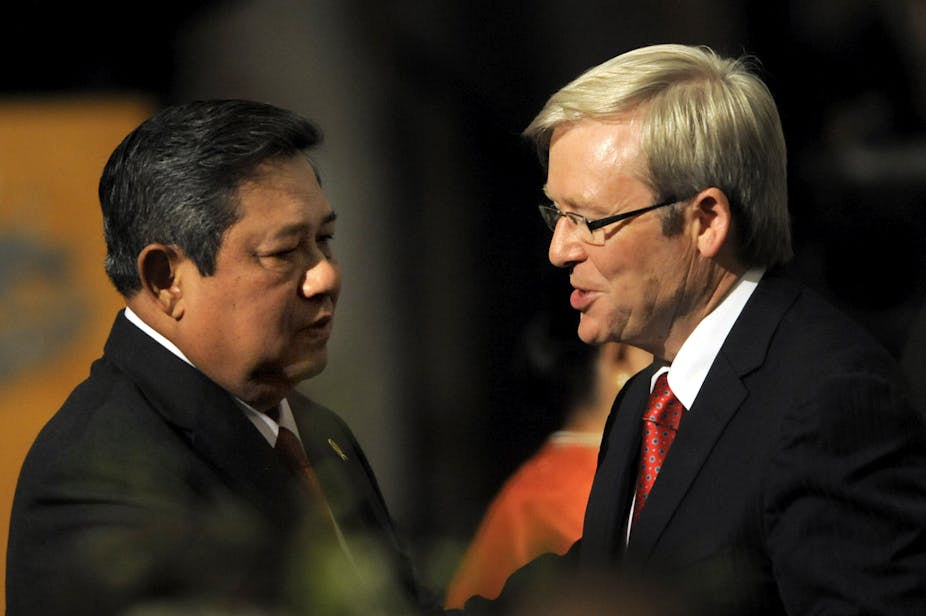If there is one thing we know from Kevin Rudd’s first period as Prime Minister it is that he was comfortable on the international stage. Although he inherited the date in his diary from Julia Gillard, it is auspicious that his first trip as the country’s “new/old” Prime Minister is to visit his Indonesian counterpart President Susilo Bambang Yudhoyono.
We hear so much about the exponential growth of China and India that it is all too easy to forget the Asian giant of economy and population just to our north.
Having worked for a number of years in Whitehall, I believe that for Australia to ignore Indonesia is the equivalent of Britain paying attention to Germany and Russia but ignoring France: strange, and probably not that clever.
This vast country of more than 240 million remains little understood. Familiar as many Australians might be with the road from Denpasar airport to an idyllic beach resort, Indonesia comprises more than 6,000 inhabited islands; is the world’s most populous Muslim country, and has more than 200 native ethnicities.
Images of Singapore and Kuala Lumpur blanketed in smoke from Sumatran forest fires, and people smugglers filmed with hidden cameras referring to desperate people as “goats”, only serve to strengthen our sense that Indonesia is a large and confused developing country. Yet no country should, or can, be understood by single events and what the media chooses to focus upon.
McKinsey estimate that by 2030, Indonesia will be home to an estimated 90 million additional consumers: more than in any economy apart from China and India. The statistics relating to the country’s growth and development are already staggering. Having largely weathered the global financial crisis, Indonesia now enjoys consistent annual growth of more than 6%.
The Gillard government’s Asian Century White Paper was a noble attempt to explain the key economic and strategic relationships that will confront us in the future. Yet the document only succeeds in presenting the broad economic and geopolitical dynamics of the region. It is important, but only as a first step in raising our awareness of how vital an understanding of Asia is to our physical, economic and environmental security.
Discussion of border protection will dominate Rudd’s visit. Every position adopted and decision made by the Prime Minister over the coming weeks will be skewed by domestic electoral considerations. The trick will be to demonstrate that Tony Abbott’s “stop the boats” slogan-based policy is more suited to the cartoon world of talkback radio, while a newly assertive and statesmanlike Rudd is able to reach practical and workable solutions that will stop the flow of migrants.
However, behind the pre-election positioning, lies an important set of strategic challenges every bit as important as border protection. Establishing and strengthening a positive and mutually re-enforcing relationship with our closest Asian neighbour is important to any Australian Prime Minister.
As with any positive relationship, Australia has as much to learn from Indonesia as they do from us. It might not be immediately apparent when you fly into Jakarta and straight into a smoke-filled haze of tropical humidity and congestion, but the Indonesian government has made sustainability and protecting what is left of its unique environment, which is rich in forest and charismatic fauna, a core policy concern.
Already the government has extended its moratorium on new forest and peat land licenses and has ambitious greenhouse emissions reduction targets in place.
These aren’t just interesting examples of a new approach to environmental politics and policy. Just as the smoke over Malaysia and Singapore is affecting people vast distances away, what Indonesia does to reduce emissions through avoided deforestation and by maintaining the rich carbon stores of their abundant peat land, stands to affect the climate and the atmosphere that we all share.
The role that avoided deforestation alone can play in reducing emissions is around 20% of the global task. This is equal to the emissions associated with all transport - every car, truck, plane and motorcycle in the world. Some of Indonesia’s major businesses are also looking to improve their environmental performance and credentials.
When I was in Jakarta last month, the first story I read in the Jakarta Post reported on Yudhoyono’s meeting with Kumi Naidoo, the executive director of Greenpeace on the Rainbow Warrior - the Indonesian President visiting perhaps the most potent symbol of environmentalist campaigning. Just last week Yudhoyono indicated that he wanted the continued input and assistance of Greenpeace and other environmental NGOs in helping inform and guide his country’s efforts on avoided de-forestation and climate change.
The existing Indonesian environmental policy agenda on no de-forestation is the equivalent to the Australian government committing to no new coal fired power stations: clear, unequivocal and authentic policy in the national interest.
In March this year the Rainbow Warrior travelled up the eastern seaboard via Sydney and Brisbane to draw attention to the threat to the Great Barrier Reef from new coal export infrastructure. Not a single Federal politician accepted the invitation to visit the boat. Kevin Rudd has spoken of engaging the young and pursuing a “new” politics. One can hope that our newly receptive and attentive Prime Minister might get some useful advice from his Indonesian counterpart.

